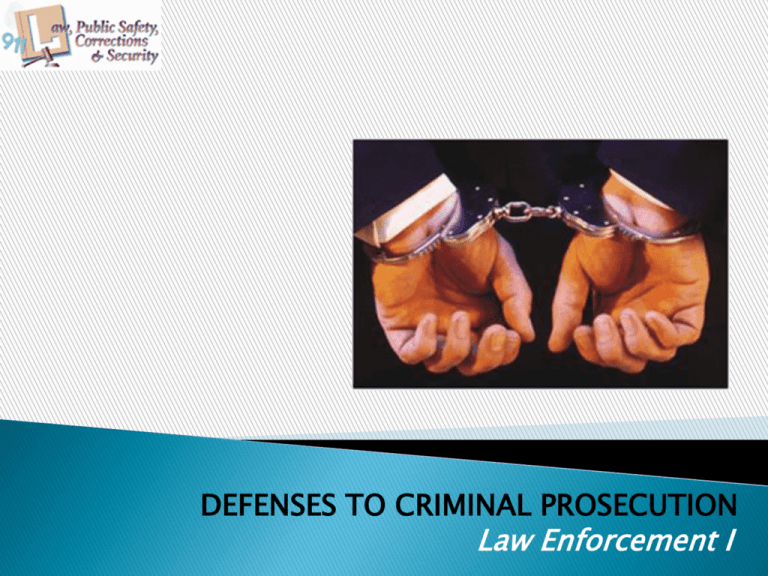
DEFENSES TO CRIMINAL PROSECUTION
Law Enforcement I
Battered Woman Syndrome
Defense
◦ History of abuse
◦ In fear of injury or death
from a probable assault by
the actor
◦ Actions based on the
assault history of the actor
against the victim
Copyright © Texas Education Agency 2011. All rights reserved.
Images and other multimedia content used with permission.
2
A husband comes home every night and
physically abuses his wife. One night, the
battered woman hears her abuser opening
the door of their home. She waits for him
just inside the door and hits him over the
head with an iron skillet when he opens the
door. The man dies from the blow to the
head. The wife is able to file the “Battered
Woman Syndrome Defense” against
prosecution.
Copyright © Texas Education Agency 2011. All rights reserved.
Images and other multimedia content used with permission.
3
PMS Defense
◦ A defense in
England and other
European
countries
◦ Not used in the US
to this date
◦ Similar to the
insanity plea
Copyright © Texas Education Agency 2011. All rights reserved.
Images and other multimedia content used with permission.
4
What
is PTSD?
◦ Post Traumatic Stress
Disorder
◦ Veterans of combat
◦ Based on hardships and
experiences endured in
combat
Copyright © Texas Education Agency 2011. All rights reserved.
Images and other multimedia content used with permission.
5
Do all Veterans have PTSD?
◦ The law specifically states Vietnam Veterans
◦ But any veteran can claim the PTSD defense if
he can show such traumatic experiences
triggered his reaction
Copyright © Texas Education Agency 2011. All rights reserved.
Images and other multimedia content used with permission.
6
A veteran who had witnessed the horrors of
war is walking down the street. He sees a
boy lying on the ground curled up in a
defensive position. A pool of blood
surrounds the boy. An adult man is beating
the boy with a steel rod. The veteran reacts
instantly to the boys outcry of pain and kills
the boy’s assailant. The veteran reacted just
as he would have in combat. Therefore, he
can fall upon the PTSD defense.
Copyright © Texas Education Agency 2011. All rights reserved.
Images and other multimedia content used with permission.
7
Who is a Juvenile?
◦ In the State of Texas
a juvenile is defined
as any child not
older than 16 years
of age and not
younger than 10
years of age
Copyright © Texas Education Agency 2011. All rights reserved.
Images and other multimedia content used with permission.
8
Why are juvenile laws different?
◦ Broken a law or in need of
supervision
◦ “Civil Offenses”
◦ Records sealed at 17 (unless
continued record of criminal activity)
◦ Sealed records cannot be opened
without a court order
Copyright © Texas Education Agency 2011. All rights reserved.
Images and other multimedia content used with permission.
9
What happens when arrested?
◦
◦
◦
◦
◦
“Taken into Custody”
Transported
Taken before a Magistrate
Written or oral statement
Fingerprinted and
photographed
◦ Released or turned over
Copyright © Texas Education Agency 2011. All rights reserved.
Images and other multimedia content used with permission.
10
Coerced or forced by another person to
commit a crime
No criminal history
Fear of
◦
◦
◦
◦
Bodily Injury
Exposure
Injury of another
Death
Copyright © Texas Education Agency 2011. All rights reserved.
Images and other multimedia content used with permission.
11
“Enticed” to commit a
crime
No criminal history
Never seen committing
such a crime
Law enforcement
provides means and
motivation
Copyright © Texas Education Agency 2011. All rights reserved.
Images and other multimedia content used with permission.
12
A law enforcement officer goes into a
neighborhood where a majority of the
people are starving. He leaves a bag of
groceries sitting on the hood of a car,
waits, and arrests the person who takes
the abandoned food.
Copyright © Texas Education Agency 2011. All rights reserved.
Images and other multimedia content used with permission.
13
Impossible to control conduct
Emotions not normal
Outside factors impact action
Action of another triggers
impulse to act
Copyright © Texas Education Agency 2011. All rights reserved.
Images and other multimedia content used with permission.
14
A man has not eaten anything for weeks. He
is walking down the street and sees a display
of apples in a cart in front of a grocery store.
The starving person walks by the store and
grabs two apples, immediately beginning to
eat one of them. A police officer sees the
offense and places the person under arrest
for theft.
Copyright © Texas Education Agency 2011. All rights reserved.
Images and other multimedia content used with permission.
15
Police are justified in their use of
force
The action defends another
The action prevents serious harm
to themselves
Copyright © Texas Education Agency 2011. All rights reserved.
Images and other multimedia content used with permission.
16
Avoid a greater evil or crime
Had no other choice
Fear of consequences if they did not commit
the crime
Any other normal, prudent person would have
made the same decision
Copyright © Texas Education Agency 2011. All rights reserved.
Images and other multimedia content used with permission.
17
A woman is drowning in flood waters. Her
arm is wedged under a fallen tree. Blood is
pouring out of her arm and the flood waters
are rising. A man finds her. In fear that she
will drown or bleed to death before other
help can arrive, he amputates her arm in
order to free her. The greater evil would
have been to let the woman drown or slowly
die from blood loss.
Copyright © Texas Education Agency 2011. All rights reserved.
Images and other multimedia content used with permission.
18
Result of
happenstance
Harm not planned
No intent to harm
No influencing factors
Copyright © Texas Education Agency 2011. All rights reserved.
Images and other multimedia content used with permission.
19
A worker is rebuilding a brick ledge. He has a
scaffolding set up on the sidewalk with a
warning sign. He turns to add another
cleaned brick to the pile, sneezes and
accidentally knocks an existing brick from
the pile. A person passing underneath the
scaffolding is struck by the brick and suffers
a skull fracture. The worker’s defense is
“Accidental.”
Copyright © Texas Education Agency 2011. All rights reserved.
Images and other multimedia content used with permission.
20
Defending oneself
No premeditation
A normal, prudent person
would have reacted in the
same manner
One level of force greater
than the force being used
against you
Copyright © Texas Education Agency 2011. All rights reserved.
Images and other multimedia content used with permission.
21
Not in control of one’s
senses at the time of the
crime
Emotionally driven
Actions contrary to
personality
The jury decides whether
to accept a plea of insanity
Copyright © Texas Education Agency 2011. All rights reserved.
Images and other multimedia content used with permission.
22
A father comes home and finds a man
attempting to rape his daughter. The father
reacts violently in defense of his daughter,
and beats the attacker over the head with
an object within his reach. His defense is
Temporary Insanity due to his mental state
when he saw his daughter being attacked.
Copyright © Texas Education Agency 2011. All rights reserved.
Images and other multimedia content used with permission.
23
Incapable of determining right from wrong
Provable in court
The jury agrees
Copyright © Texas Education Agency 2011. All rights reserved.
Images and other multimedia content used with permission.
24
Conduct prohibited by law, although not inherently
evil
Mostly statutory crimes such as
◦ Drunk driving, public intoxication, drug abuse, gambling,
and carrying a concealed weapon
“Wrong because it is prohibited”
Usually incurs only minor
infractions/misdemeanors; no serious punishment
Attempt to regulate the behaviors of society
Crimes that do not harm people or property
Copyright © Texas Education Agency 2011. All rights reserved.
Images and other multimedia content used with permission.
25
Actions that are wrong in themselves; acts that are
morally wrong; offenses against conscience
Usually common-law crimes or those that are
dangerous to life or limb
“Wrong in itself”
Examples: assault, theft, prostitution, and murder
Copyright © Texas Education Agency 2011. All rights reserved.
Images and other multimedia content used with permission.
26





